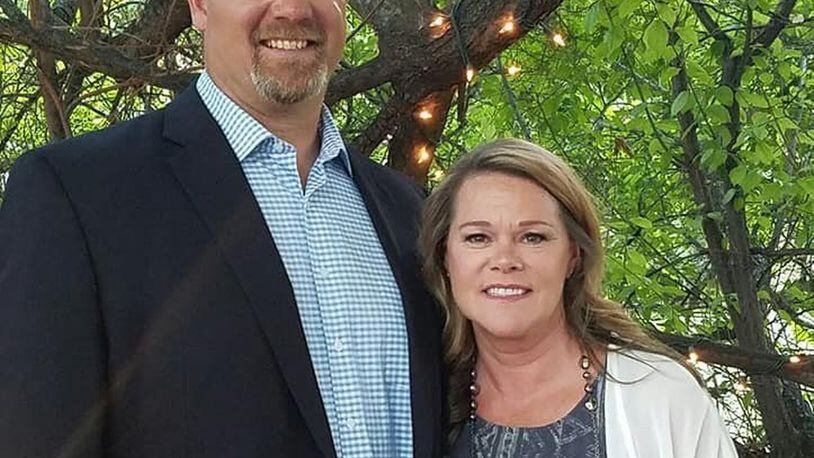RELATED: Las Vegas shooting: Live updates
As Riley was in line for a drink at the Route 91 Harvest country music festival, gunshots rained down.
“All of a sudden, we heard, pop, pop, pop,” he said. “Then there was a brief pause and it was automatic fire.”
Moments later in the pandemonium Riley felt his own leg burning, a sensation quickly forgotten as a woman in front of him collapsed to the ground, shot in the chest, he said.
“At this point, (the gunman’s) just spraying the crowd,” said Riley, who was also trying to locate his fiancee in a mass stumble for cover.
PHOTOS: Deadly Las Vegas mass shooting
Riley and another man found shelter for the woman, performed CPR and attempted stop her bleeding. A third lifted her into a wheelbarrow and pushed her toward safety.
Then Riley collapsed from his own injuries.
“No one will ever know the nightmare of what these people went through and what they witnessed,” said Rita Riley, Todd’s mother, who still lives in Springfield. “You don’t think to experience that at a concert.”
Carnage becomes clear
Jen and Zach Rupert of Germantown were in Las Vegas for a long weekend celebrating their fifth wedding anniversary. They were at a street-level bar as shots rained down from a 32nd floor of the Mandalay Bay hotel room - on the same floor as their room.
“At first there were reports of multiple shooters at multiple hotels and we didn’t know what to do so we hunkered down,” said Jen Rupert. “It’s tragic that one person can do that to so many people.”
RELATED: Local officials constantly weighing safety procedures
After the shooting stopped, the Ruperts left the bar to seek shelter in a nearby food court where the severity of the night’s carnage became clearer: they heard a bloodied man tell another through his phone that despite giving CPR to a victim the person died.
“Even the police officers were saying if you go out there we can’t guarantee your safety,” Jen Rupert said. “Thankfully we were not in the hotel. You start thinking about every decision you make when something like this happens and how one choice could lead to something different.”
‘It’s going to weigh on him’
Back at the festival site, a man applied a tourniquet to Riley’s leg and taken to a hospital for treatment. The school principal was hit by shrapnel in the calf, knee, thigh and belly.
As he left the hospital, he passed the young woman he performed CPR on at the concert. It appeared she didn’t survive, Riley said.
RELATED: How to help the victims of the Las Vegas shooting
“I’m sore, emotionally and physically,” he said Tuesday from his home in Thornton, Colo. where he is receiving further medical attention.
But Rita Riley said her son’s greatest wound may be his inability to save the woman’s life.
“I think it’s going to weigh on him for a while,” Rita Riley said. “I think that’s going to be the hardest thing for him to heal from. He tried his best.”
Bullets ‘meant for me’
Emotional trauma will be a serious concern not only for victims and survivors of the Las Vegas shooting, but also for ordinary citizens struggling to comprehend why such terrible events occur, say those who work in the mental health field.
The resulting shock, sorrow, anger and fear that make it difficult for some to view the world as anything but a more dangerous place than it was before the shooting, said Ann Stevens, spokeswoman for Montgomery County Alcohol, Drug Addiction and Mental Health Services.
“We may never get answers that are satisfactory to our questions,” Stevens said. “But there are things that you can do to help yourself process all of this.”
MORE: Acts of heroism emerge in chaos of Las Vegas shooting
Centerville psychiatrist Dr. Kathy Platoni knows firsthand what victims and those affected by shooting are struggling with, including survivor’s guilt.
In 2009, Platoni was stationed at Fort Hood, Texas when a gunman opened fire and killed 13 people while wounding 30 others. Although she was on the shooter’s hit list, she happened to be out of the room while the shooting occurred.
“I still live with the fact that several of those rounds were meant for me,” Platoni said. “I’ve tried to grow from that and rise to every challenge in terms of treating as many people who go through this traumatic event.”
Platoni treats patients dealing with PTSD, the onset of which doesn’t necessarily require being a direct participant in a traumatic event, she said. “It can also traumatize friends and family people who see it over and over again on the news.”
It’s easy for a person — and especially young people — to become overwhelmed by the overexposure to information following mass shootings and lead to stress as well as negative and pessimistic feelings, Stevens said.
“Seeing frightening images repeatedly can be traumatic for children, so talking about what they have seen and limiting exposure is important.”
Talking to others who are supportive will typically help many cope with fears and concerns arising from harrowing events, Stevens said. But some may want to seek professional counseling. In Montgomery County, a referral can be obtained by calling Crisis Care at 937-224-4646.
